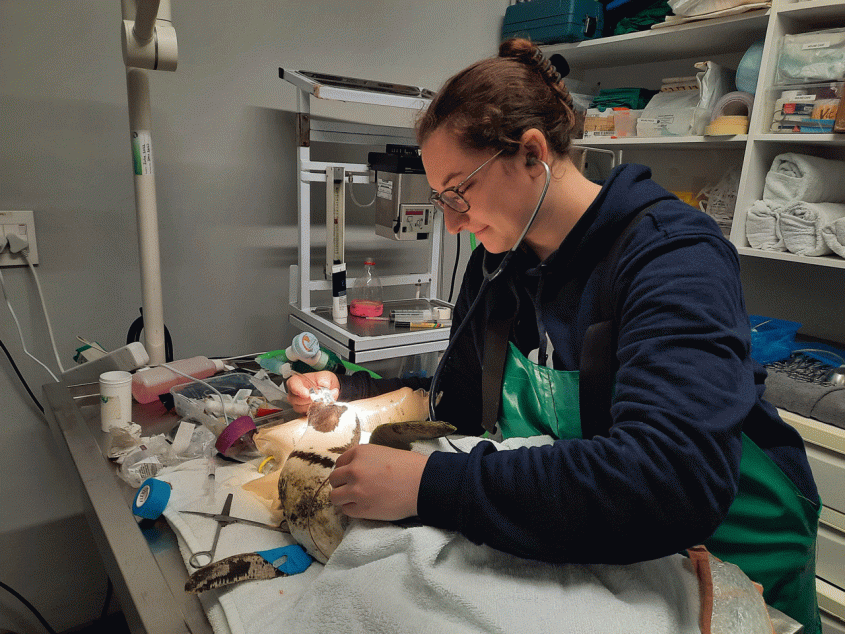Student blog: Working towards the conservation of the African penguin
There are times in life where things don’t go as expected, including on June 13, 2023, when I showed up for the first day of my project at SANCCOB, the Southern African Foundation for the Conservation of Coastal Birds, as part of the Cornell University College of Veterinary Medicine’s Expanding Horizons Program. I was introduced to the staff veterinarian, Dr. Roberts, who I was to spend the next two months learning from. He said, “It’s nice to meet you. We are excited to have you. I’m on leave for a month starting tomorrow.”

Needless to say, I was not expecting to have to navigate a new country, a new organization, and the constant rotation of part-time veterinarians all at once, but I’m glad that I did. Not only did I get to learn from multiple veterinarians with all sorts of different backgrounds and knowledge, but I also became a crucial part of the veterinary team, maintaining continuity as new veterinarians came and went. I worked to become an expert in the different medical cases and kept the veterinarians up to date about treatment plans and medical goals. Taking on this responsibility showed me how far I’ve come in my veterinary education. I know now that I can trust my instincts and that I can apply what I have learned to future veterinary patients.
Safe haven for seabirds
SANCCOB, tucked away in the suburbs of Cape Town, South Africa, is a champion of seabird conservation, where injured and sick birds come for rescue, treatment and rehabilitation for release back into the wild. This work is especially important for the African penguin, whose population has plummeted over the last few decades. SANCCOB provides a safe place for these birds to heal and build up swimming strength before being released back into the local penguin colonies. There are many reasons that African penguins, and other seabirds like Cape gannets, gulls, and Cape cormorants end up at SANCCOB. Starvation due to the lack of fish in the ocean is very common and birds will often show up emaciated and anemic. These birds require a gentle reintroduction to food, involving fluids and nutritional formula. Other SANCCOB patients arrive with injuries or illnesses – broken wings or legs, various toxin poisonings, blood parasites, or wounds from predation. These birds are triaged and treated until they are strong enough to go through the rehabilitation process. Sometimes this treatment involves surgical procedures like foot amputations or wound closures. Another common reason for birds to come to SANCCOB is abandonment. Abandoned chicks or eggs will reside in the chick rearing unit and later, the nursery, and be raised until they are old enough to be released. This year saw a large influx of penguin chicks due to major flooding of nests in the colonies.

Success story
No matter the reason that a bird arrived, I felt so lucky to be a part of this conservation effort and to follow these cases from admission to release. One particular case that stands out to me is that of G045, a Cape gannet that arrived with a fracture of the ulna, a bone that is crucial for flight. Gannets spent most of their time at sea and require perfectly working wings to hunt. When a gannet hunts for fish, they tuck their wings back at a steep angle and enter the water at speeds of over 60 mph. This incredible maneuver requires the wings to be aerodynamic, strong, and flexible, something that a fracture can easily destroy. When G045 arrived to SANCCOB, the broken bone was well-aligned so that the veterinarian opted for a splint rather than surgical repair.
If the callous formed during G045’s healing process was too large, it could have prevented the bird from being released. Instead, over a stay of 73 days, G045 healed so well that it was impossible to tell apart from the other gannets when swimming in the rehabilitation pools. In my second-to-last week in Cape Town, I accompanied G045 and two other gannets out on a boat into the open ocean, and was filled with joy as I let G045 out of its box to fly across the waves.
Making a difference
I am truly grateful for the funding and support of the Cornell University College of Veterinary Medicine’s Expanding Horizons International Experience Program and the support of SANCCOB, which made it possible for me to explore the world and work with animals I have only ever dreamed of working with. Of course, every experience comes with difficulties. Adjusting to a new country isn’t easy and it takes work to find a support system in a new city. Even at SANCCOB, just like any veterinary practice, the cases were not always successful. There were birds that were too injured to survive or to be released into the wild. There were birds that passed away after a long course of treatment, causing grief for those of us that worked with them. There were birds that just couldn’t be saved. However, when I think about the feeling I had as G045 raced across the open ocean with newfound freedom, I know that what I did in these two months made a difference.

Reiss Gidner is a D.V.M. student at Cornell University College of Veterinary Medicine (Class of 2025). She is interested in wildlife and zoologic medicine and hopes to work towards the conservation of wild animals all over the world. She hopes to explore how minimally invasive procedures can reduce stress and improve outcomes for wildlife. She is also passionate about organized veterinary medicine and plans to be involved with the AVMA after graduation.





